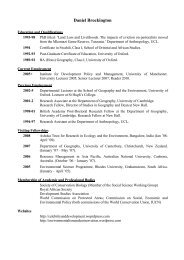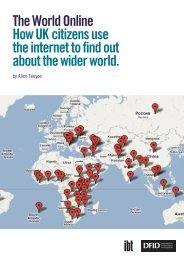World
Viewing the world - Full report
Viewing the world - Full report
- No tags were found...
Create successful ePaper yourself
Turn your PDF publications into a flip-book with our unique Google optimized e-Paper software.
after each one. There was a desire to have stories followedup as is shown in this exchange between two groupmembers:1st: I think Bob Geldoff made quite an impact. I thinkthat he saw that they had good land to grow on and theyhad water and things like that. I don’t know how long itlasted.2nd: We never hear. We don’t know. (Low income,Glasgow).Mass media were the key source of information formost respondents but some also used informationdrawn from schooling or holiday experiences. A smallnumber of people had lived in developing countries orbeen there for long periods of time because of theirprofession, for example serving in the British Army. Inone case we found that the negative perceptions of aformer serviceman led him to agree with negative mediaimages. But more commonly we found that directexperience of the developing world led to sharp criticismsof media representations. For example, a woman withextensive experience of India commented on the ‘huge’generalisations which are made it in the media:It is such a huge country, it changes from region to regionand city to city and because of that it is difficult tocompare what you see on television with what the countryis like. It is so diverse and all the states are manageddifferently. I don’t think you really get the impression ofthat when people talk about it on TV certainly, unless itis a documentary about a specific region … Huge generalisationsare always made about religion and things likethat. (Middle class, London).A group of Asians described their responses to mediacoverage of the recent coup in Pakistan. One had actuallyphoned his father in order to get an alternative view:1st: I was watching the news at 5 o’clock, 5.30, 6.30, 7, tosee what was happening. Because I get the ethnic minoritynewspapers it was so weird comparing that to what thenewspapers here say, like this is a coup and it is terribleand a democratic process has been violated and this thatand the next thing. The newspapers were saying, but thepeople want that.2nd: I couldn’t understand it, I actually phoned my dadand said what is happening?1st: As soon as you hear the term coup you think bloodshed and violence. The following day you still see the guy… There was no violence. (Ethnic minority, Asian,Glasgow).But it appeared that for many in the groups, theconstant flow of negative images had a strong influenceon the development of some beliefs. For example:The trouble is African states are at war constantly, theyare never not. It is the only place in the world that hasnever stopped warring with each other’ (Low income,Bath).It was also clear that children’s attitudes had beeninfluenced very strongly as for example in this exchangeon why it would not be worth having travel programmesabout India:Moderator: Do you think there are many travelprogrammes on countries like Asia and India?1st: Not on India.2nd: No-one goes there so why do they want to.3rd: It is not a popular tourist attraction because in Indiathey have always got problems.2nd: It would be a holiday nightmare if someone went toIndia. The houses are full of bugs.Moderator: So it doesn’t sound appealing to go there?2nd: The swimming pools are full of cockroaches andstuff.3rd: There is always terrorists over there anyway. (15year-olds, London)The extraordinary mixture of ideas which childrengather about development is conveyed in this exchangebetween 15 year-olds in London, who are discussing theissue of third world debt:Moderator: Does anybody know anything about or seenanything on TV about the debt campaign?1st: The what?2nd: Yes.Moderator: Removal of third world debt.1st: No.3rd: Is it 50p a month and you can help them?2nd: We pay them and they don’t pay us back.4th: You get to help a child and all that stuff.5th: Pay 50p a child.2nd: Do they owe us?6th: They owe us twice the amount.2nd: We will never get it back.138 DFID – July 2000





